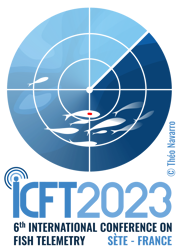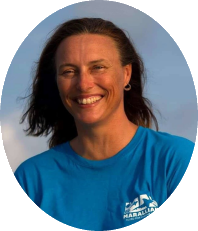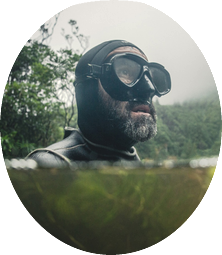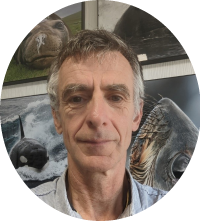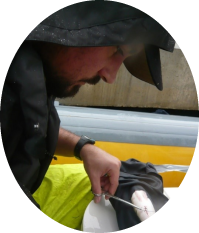Quick Access > Keynote Speakers
|
|
Rachel Graham Dr Rachel Graham is a conservation scientist with over 30 years of experience in development and environment projects in Latin America, Africa, and Oceania. She grew up in Tunisia and has lived in Central America for the past 30 years and has a BSc in Zoology from Oxford, an MSc from Edinburgh and an interdisciplinary Ph.D. from the University of York that addresses whale shark ecology, reef fish spawning aggregations, associated fisheries, and wildlife tourism. In 2014, she founded and leads the international NGO MarAlliance and is now based in Panama. Rachel has dedicated her life to dedicated to seeking win-win solutions for people and fish to rewild the oceans with threatened marine wildlife, notably sharks and rays. Her science focuses on creating population baselines, deciphering the spatial ecology, tourism and small-scale fisheries of endangered marine species. She works with fishers and decision-makers to implement co-created conservation opportunities and strategies for abating threats to long-lived marine wildlife that include the development of economic supplementation or alternatives to unsustainable fisheries. An active member of IUCN's Shark Specialist Group, the Species Monitoring Group and the World Commission on Protected Areas, Rachel also leads or participates in several advisory committees to better facilitate information sharing as well as management and policy reform for elasmobranchs. Rachel has published over 80 peer-reviewed papers, lay articles and photos and has been profiled in global news media. In 2011, Rachel won the Whitley Fund for Nature Gold Award for her work with sharks and communities, in 2021 the Pew Marine Fellowship and 2022 the Oceana Ocean Hero Award for marine conservation outcomes. She is proudest of her two sea-loving sons.
|
|
|
|
Pedro Afonso Pedro Afonso is a Portuguese marine and fisheries biologist specializing in applied ecology, whereby he employs rigorous analysis of empirical biological data to promote the conservation and sustainable exploitation of marine living resources. He earned my PhD in Zoology at the University of Hawaii (US) in 2007 under Fullbright, FLAD and FCT scholarships. He published 110 ISI papers and several book chapters. He leads research that develops novel biotelemetric and modelling approaches to identify and incorporate essential fish habitat in the optimal design of coastal, deep sea and pelagic Marine Protected Area networks. He coordinate the joint MPA task force with the Azorean Regional Administration. At the local level, his 1XX-year experience in the field monitoring fish populations and interacting with stakeholders has rendered me recognition among peers, managers, and fishers as a key player in spatial planning. He have wrote and played major roles in various national and international (EU, US) projects, including PI in several national projects, IMAR PI and WP leader in two EU FP6/FP7 projects, and WP/task leader in two ongoing 2nd stage H2020 proposals. He developed a solid network of international collaborations and coordinated or participated in research cruises in the Indian, Pacific, and Atlantic Oceans. He coordinates the IMAR Biotelemetry Group and stand as NE Atlantic (Europe) coordinator of the Ocean Tracking Network, the largest global marine biotelemetry program. Pedro have done a good deal of biotelemetry development (testing and designing new tags and sensors, robotics) together with international research partners and world leading manufacturers.
|
|
|
|
Christophe Guinet Christophe Guinet is a CNRS research Director at Centre d’Etudes Biologiques de Chizé, UMR 7372 La Rochelle Université-CNRS. He graduated with a doctorate in oceanology at the University of Marseille in 1991 and was recruited at the CNRS in 1992. Christophe Guinet is a member of Marine Predators Team at CEBC. The first focus of his work is to better observe and understand how the oceans work through the animals that live in them. To do this, Christophe equip seals in polar environments with a set of tags specially designed for providing critical information on their behavior at sea along environmental conditions. A broad range of oceanographic parameters is monitored: physical (temperature, salinity), biogeochemical (dissolved oxygen, phytoplankton concentrations) and biological (bioluminescence, and mid-trophic levels organisms) along the track and the dives of these seals. The ultimate goal of this research program is to better understand how the polar oceans are changing in response to global warming and what the consequences of these changes are on the foraging performance and demographics of these predators. His second area of work is the study of interactions between fisheries and cetaceans, particularly between killer whales and sperm whales in the context of the toothfish fishery in the French Southern Territories. The objective is to better understand the depredation behaviour of killer whales, sperm whales but also fishermen, in order to try to solve this conflict of use impacting both cetaceans and fishermen. He is particularly fond of supervising students who he found humanly very enriching and scientifically stimulating through the new questions they raise. The work carried out with his students and collaborators has resulted in the publication of more than 200 scientific articles.
|
|
|
|
Pablo Arechavala-Lopez Marine Biologist and PhD in Marine Sciences (University of Alicante, Spain), Pablo Arechavala-Lopez has a solid training on ichthyology, with extensive experience on ecology, behaviour and welfare of fishes in aquaculture environments. Researcher at the Spanish Research Council (IMEDEA-CSIC), he is the author of several reports, scientific articles published in indexed journals and book chapters. He has an active participation and leadership on several projects throughout the Mediterranean Sea and along the NE-Atlantic coasts. His works mainly focus on assessing the interaction of aquaculture activities with farmed and wild fish populations in order to ensure a more sustainable and responsible aquaculture activity. He applies telemetry techniques to better-understand fish behaviour aggregated to farms and its implications on coastal ecosystems and fisheries, as a potential tool for conservation strategies and sustainable/responsible coastal management plans. More recently, his experience in farmed fish has led him to participate in diverse international projects, diving into precision fish farming, to assess fish behaviour in rearing environments and develop animal-based indicators of fish welfare. Specifically, his latest studies focus on fish welfare assessment through physiological and behavioural adaptations of fish to new (rearing) environments, effects of environmental enrichment and fish stress resistant, humane stunning and slaughtering techniques, and rising welfare management plans at commercial and global scale.
|
|
